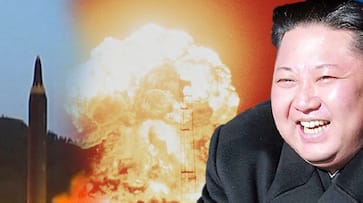Speaking on the sidelines of an Asian security forum in Singapore, US Secretary of State Mike Pompeo told reporters that the US has new, credible reports that Russia is violating UN sanctions by allowing joint ventures with North Korean companies and issuing new permits for North Korean guest workers
US Secretary of State Mike Pompeo warned Russia, China and other countries on Saturday against any violation of international sanctions on North Korea that could reduce pressure on the North to abandon its nuclear weapons. Pompeo's comments came on the heels of a new United Nations report that found North Korea has not stopped its nuclear and missile programs and is violating UN sanctions, including through illicit ship-to-ship transfers of oil.
Speaking on the sidelines of an Asian security forum in Singapore, Pompeo told reporters that the US has new, credible reports that Russia is violating UN sanctions by allowing joint ventures with North Korean companies and issuing new permits for North Korean guest workers. He said Washington would take "very seriously" any violations, and called for them to be roundly condemned and reversed.
"If these reports prove accurate, and we have every reason to believe that they are, that would be in violation," Pompeo said, noting that the UN Security Council had voted unanimously in favour of the sanctions. "I want to remind every nation that has supported these resolutions that this is a serious issue and something we will discuss with Moscow."
"We expect the Russians and all countries to abide to the UN Security Council resolutions and enforce sanctions on North Korea," he said. "Any violation that detracts from the world's goal of finally, fully denuclearizing North Korea would be something that America would take very seriously."
At the United Nations, meanwhile, a summary of a report by experts monitoring UN sanctions against North Korea was sent to the Security Council on Friday that said North Korea is continuing with both its nuclear and missile programs. And, in addition to the oil transfers, it said the North was violating sanctions by transferring coal at sea and flouting an arms embargo and financial sanctions.
Late Friday, US Ambassador to the United Nations Nikki Haley raised the alarm, saying that "talk is cheap." ''Russia cannot support sanctions with their words in the Security Council only to violate them with their actions," she said in a statement. She made the remarks as the US asked the Security Council to add a North Korean bank executive, a North Korean company, a Chinese company and a Russian bank to the UN sanctions blacklist.
In his discussions with Southeast Asian officials in Singapore, Pompeo said he had implored them all to "strictly enforce all sanctions," including an end to ship-to-ship transfers of oil for North Korea, and had been encouraged by the response.
Despite the warning to Russia, Pompeo said he remained optimistic that North Korean leader Kim Jong Un will follow through on his pledge to President Donald Trump to denuclearize. But he said the timeline for the North's full and final denuclearization remains a work in progress.
Earlier, in an interview with a Singapore's Channel News Asia, Pompeo had said the pace for the dismantlement of the North's nuclear weapons program would rest with Kim. "The ultimate timeline for denuclearization will be set by Chairman Kim, at least in part," he said. "The decision is his."
At the news conference, however, Pompeo appeared to step back from that comment, noting that the timeline is subject to negotiation between Washington and Pyongyang. He recalled that Kim had committed to denuclearization at the historic summit with Trump on June 12 in Singapore and that both sides "have been working since then to develop the process through which that will be achieved."
"The process of achieving denuclearization of the Korean peninsula is one that I think we have all known will take some time," Pompeo said, adding later: "I am optimistic that we will get this done in a timeline and the world will celebrate what the UN Security Council has demanded."
Pompeo said on Friday that while there's "still a ways to go," the United States remains "confident" in North Korea's commitment to denuclearize.
On Thursday, the White House announced that Trump had received a new letter from Kim and had responded quickly with a letter of his own. The correspondence came amid fresh concerns over Pyongyang's commitment to denuclearization despite a rosy picture of progress painted by Trump.
Last Updated Aug 4, 2018, 12:04 PM IST









![Salman Khan sets stage on fire for Anant Ambani, Radhika Merchant pre-wedding festivities [WATCH] ATG](https://static-gi.asianetnews.com/images/01hr1hh8y86gvb4kbqgnyhc0w0/whatsapp-image-2024-03-03-at-12-24-37-pm_100x60xt.jpg)
![Pregnant Deepika Padukone dances with Ranveer Singh at Anant Ambani, Radhika Merchant pre-wedding bash [WATCH] ATG](https://static-gi.asianetnews.com/images/01hr1ffyd3nzqzgm6ba0k87vr8/whatsapp-image-2024-03-03-at-11-45-35-am_100x60xt.jpg)


